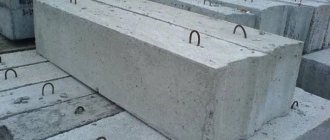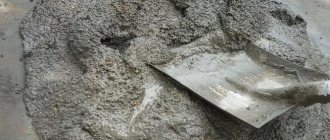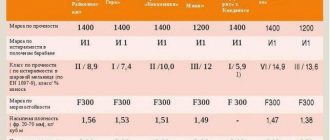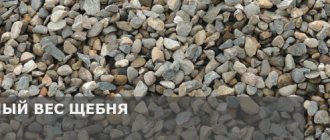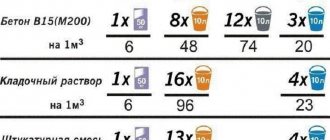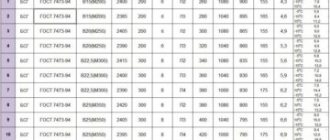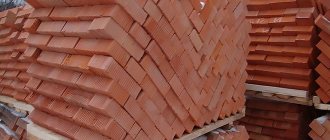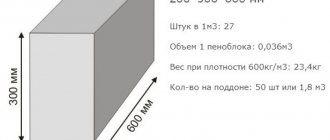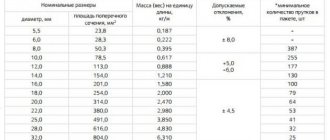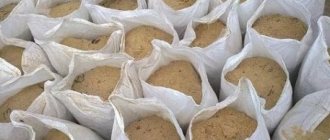Concrete weight depending on class and brand
Even novice builders know that cement-sand mortar can be of different brands. When using cement grades M300 and M500, the difference in the mass of concrete can reach 500-700 kg. It's all about the density of cement, which varies greatly depending on the filler.
The weight of various structures often has to be calculated in construction
Today there are 4 main types of concrete:
- very light;
- lungs;
- heavy mixtures;
- very heavy.
The heaviest types of concrete are used during the construction of special-purpose structures: bunkers, waste storage facilities, power plants and other buildings. The weight of one cube of concrete can reach or exceed 3 tons.
Heavy varieties are reinforced types of concrete used during monolithic construction or during the manufacture of foundations.
Lightweight, porous types of material have a significantly lower specific gravity of concrete. Light varieties include expanded clay concrete, wood concrete, concrete particle blocks, aerated concrete, etc. They are actively used in finishing work, during the construction of low-rise buildings and as thermal insulation materials.
How much does 1 cube of concrete weigh:
- the lightest concretes (M50-M75), their weight is up to 500 kg with lightweight fillers;
- light mixtures (M100-M200) with low-density fillers can weigh from 700 kg. In its pure form, cement + sand, the weight reaches 2.4-2.5 tons;
- heavy concrete (M200-M400) weighs from 1.8 tons to 2.5 tons. Compositions made with crushed stone or with the addition of gravel are always quite heavy, their weight starts from 2.3 tons;
- especially heavy types weigh from 2.5 tons, their grade is from M400.
Light, porous types of material have a significantly lower specific gravity of concrete.
Weight of 1 cubic meter of concrete, depending on the brand:
- M100 – 2.49 t;
- M200 – 2.43 t;
- M300 concrete – 2.5 t;
- M400 concrete – 2.38 t;
- M500 concrete – 2.98 t.
Using the data presented, you can easily calculate how much weight is in a liter: 0.001 m3 * 2.49 t = 2.5 kg of M100 concrete without aggregates.
Specific gravity of liquid concrete
| Brand | Mass of a cube of liquid concrete, t |
| M100 | 2,366 |
| M150 | 2,36 |
| M200 | 2,362 |
| M300 | 2,358 |
| M400 | 2,35 |
| M500 | 2,355 |
The ratio of mass to occupied volume (specific gravity) depends on the proportions of the components, the volume of liquid, the mixing method, etc. The volumetric mass of liquid concrete and methods for its calculation are prescribed in GOST 12730.1-78.
How to determine the weight of 1 cube of concrete
To have a correct idea of how many kilograms of concrete are in a cube, you can use the tabulated values for the specific gravity of 1 cubic meter of concrete or resort to calculating the weight of the different components. Cement and sand are used to prepare high-quality concrete, and dense filler can be used to build the foundation: gravel, crushed stone, etc. Concrete calculations are easy to make if you know the proportion of the mixture.
The designation of concrete cubic meters is not a constant and depends on various characteristics. If the accuracy of the calculation is important, we recommend that you first establish the proportions of the mixture and then calculate how much a cubic meter of concrete weighs. The principle of calculating this characteristic is as follows: we determine the proportion of all elements in the composition, from the table we find out the specific gravity of the materials and combine them.
Weight of 1 cube of concrete
The weight of concrete mortar for heavy concrete is:
- We determine the proportion of the mixture, for example, TskhPkhShch - 1 to 3 to 4. There are 8 parts of materials in total, and cement occupies 1/8: 1/8 = 0.125 m3.
- Weight of cement at a specific density of 1400 kg/m3: 0.125 * 1400 = 175 kg.
- Mass of sand at a density of 1600 kg/m3: (0.125*3) * 1600 = 600 kg.
- Weight of crushed stone at a density of 1400 kg/m3: (0.125*4) * 1400 = 700 kg.
- Add the weight of the liquid, depending on the desired viscosity of the composition, 0.5-0.7 l per 1 kg of cement: 0.6 * 175 ~ 100 l.
- Weight of the entire solution: 175 + 600 + 700 + 100 = 1575 kg/m3.
In fact, the weight will be greater, since we used the density of the materials without compaction, and accordingly, when adding water, the material will compact and become heavier. To get a real figure, you can immediately use the characteristics of several compacted materials, but there is a simple way - add approximately 200 kg/m3 to the result. Approximately this value will be fair. The output weight is approximately 1800 kg/m3.
What to pay attention to
What determines how much 1 cube of concrete weighs:
- the mass of 1 cube of concrete varies depending on the density of the filler. To increase the weight of the composition, gravel is often added. Expensive but heavy materials include marble (2.3-2.6 t/m3) and granite (2.7 t/m3);
- To determine the weight of a cube of concrete, it is important to consider the degree of compaction of the materials. Fresh cement weighs 1.1-1.3 t/m3 depending on the brand; during transportation the material is shaken, increasing the density to 1.3-1.5 t/m3. If the material is stored for a long time, it cakes, and the density can reach 1.5-1.6 t/m3. Similar processes occur in other materials;
- the type of components is of utmost importance. Crushed stone comes in various types: from slag weighing 800 kg/m3 to 3 t/m3 of secondary material produced by the metallurgical industry;
- the fraction of the components greatly affects the weight. The largest fraction of compacted material has the highest specific gravity. Gravel slag of fraction 0-5 weighs 1600 kg/m3, and fraction from 160 – 1730 kg/m3.
The mass of concrete is a fundamental characteristic when calculating the bearing capacity of the foundation and walls. If necessary, the weight can be increased by adding heavy components, or reduced by using lightweight materials.
